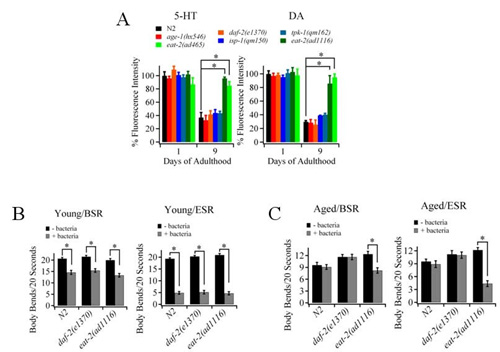Time:2014-03-14
Much of the current aging studies in model organisms focus on the regulation of lifespan. More than one hundred genes have been identified to regulate the lifespan of many animals from C. elegans to vertebrates. Aging is also accompanied by behavioral and cognitive decline, however whether well-known longevity genes affect age-related behavioral deterioration is a key question that remains largely unanswered in the field of aging research.
A study from Dr. CAI Shiqinga€?s lab at the Institute of Neuroscience, Shanghai Institutes for Biological Sciences, reported that extension of lifespan does not necessarily delay age-related behavioral deterioration. Wild-type C. elegans and long-lived worms with defective insulin signaling [daf-2(e1370), age-1(hx546)] or mitochondria function [isp-1(qm150), tpk-1(qm162)] showed similar decline in serotonin/dopamine level and deterioration of some important behaviors, including food-intake and male mating, during aging. By contrast, long-lived worms with dietary restriction [eat-2(ad1116)] delayed age-related serotonin/dopamine loss and associated behavioral deterioration. Moreover, elevating endogenous serotonin/dopamine level ameliorated age-related behavioral deterioration in both wild-type and long-lived daf-2(e1370) aged worms, arguing that improved neurotransmitter signaling may be one strategy for ameliorating age-related behavioral impairment.
Their study also revealed that accumulation of reactive oxygen species (ROS) is a key factor that causes decreased expression of dopa-decarboxylase BAS-1, the shared 5-HT/DA synthetic enzyme. Age-related reduction in expression level of dopa decarboxylase BAS-1 is responsible for the decline in 5-HT/DA levels. Dietary restricted worms require PHA-4 and its effectors superoxide dismutases and catalases to sustain high level of 5-HT/DA and preserve animal behaviors. The study demonstrates that dietary restriction preserves healthy behaviors in aged worms at least partially by sustaining a high 5-HT/DA level, and provides new insights to understand aging of the nervous system.
This work was mainly carried out by graduate student YIN Jiangan, research assistant LIU Xijuan, and colleagues under the supervision of Dr. CAI Shiqing. The work entitled "Longevity manipulations differentially affect serotonin/dopamine level and behavioral deterioration in aging Caenorhabditis elegans" was published in The Journal of Neuroscience on March 12, 2014.

Figure A, Changes of 5-HT/DA level in long-lived worms with age. Long-lived insulin signaling or mitochondrial [isp-1(qm150), tpk-1(qm162)] mutant worms daf-2(e1370) and age-1(hx546) show similar age-related decline in 5-HT/DA, but long-lived worms with dietary restriction [eat-2(ad1116), eat-2(ad465)] maintain high 5-HT/DA level. B, Food-induced slowing responses in young worms. In the presence of bacteria, well-fed worms reduce their locomotion, a DA-mediated behavior known as basal slowing response (BSR). Food-deprived animals,when encountered new food, undergo a dramatically enhanced slowing response (ESR).This experience-dependent ESR is mediated by 5-HT. C, Food-induced slowing responses in old worms.
 附件下载:
附件下载: